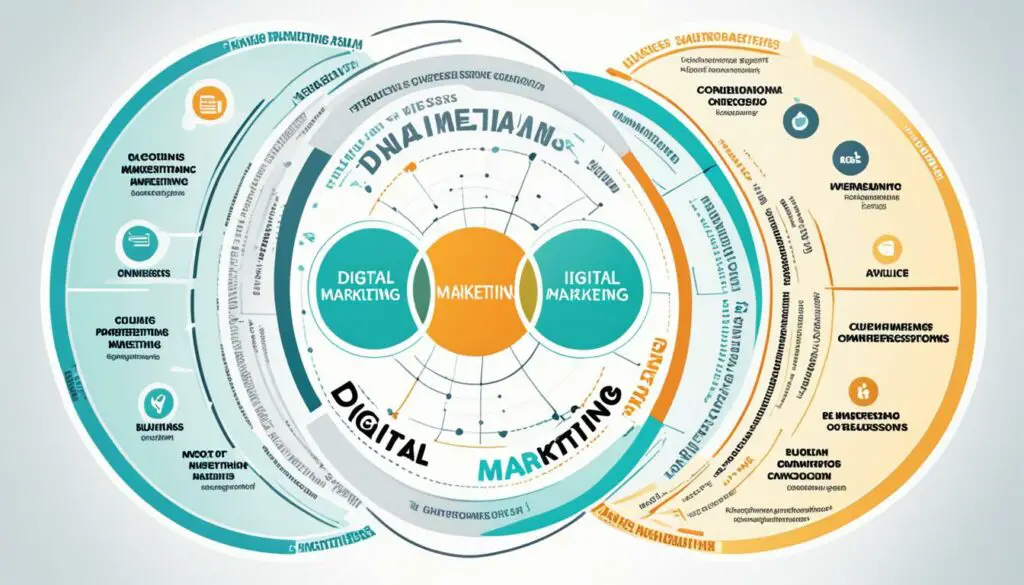In today’s technology-driven world, both digital marketing and business analytics play crucial roles in the success of organizations. Digital marketing focuses on promoting products and services online and engaging with the target audience, while business analytics involves analyzing data to make informed decisions and improve business operations. Both fields are interdependent and offer numerous job opportunities. This article will explore the key differences, similarities, and benefits of digital marketing and business analytics.
Key Takeaways:
- Digital marketing and business analytics are essential for the success of organizations in today’s technology-driven world.
- Digital marketing is focused on promoting products and services online, while business analytics involves analyzing data to make informed decisions.
- Both fields offer numerous job opportunities and are interdependent on each other.
- Combining digital marketing and business analytics can provide powerful insights and drive business growth.
- Understanding the similarities and differences between digital marketing and business analytics can help professionals make informed career choices.
Understanding Digital Marketing and Its Importance
In today’s online-centric world, digital marketing has become an essential component of business success. With the increasing number of people relying on the internet for information, entertainment, and purchasing decisions, having a strong digital presence is crucial for businesses of all sizes. Digital marketing enables organizations to establish an online presence, connect with their target audience, and promote their products and services effectively.
Through digital marketing, businesses can engage with customers on various platforms, create compelling advertisements, and network with potential clients. It offers a range of promotional opportunities, including social media marketing, content marketing, search engine optimization (SEO), and email marketing. These strategies help businesses reach their target audience directly and drive promotions to generate revenue.
The beauty of digital marketing lies in its ability to simplify marketing tasks. With the use of automation tools and analytics, businesses can streamline their marketing efforts, track the effectiveness of campaigns, and make data-driven decisions. This simplification of tasks enables businesses to focus their time and resources on developing effective marketing strategies and reaching their target audience more efficiently.
Overall, digital marketing has revolutionized traditional marketing practices. It provides businesses with the tools and techniques to connect with their audience, showcase their products, and build brand awareness. As the digital landscape continues to evolve, it is crucial for businesses to invest in digital marketing strategies to stay competitive and thrive in the online marketplace.
Exploring Business Analytics and Its Importance
Business analytics is a fundamental aspect for organizations seeking to evaluate the outcomes of their marketing strategies and make data-driven decisions. This field encompasses various activities, such as data analysis, statistical operations, and the formulation of models. By leveraging these techniques, businesses can strengthen their operations, generate better results, and maximize revenue generation.
Without business analytics, marketing and promotional efforts may be wasted, as organizations would lack the necessary insights to make informed decisions. By analyzing data and understanding the statistical relationships within it, businesses gain valuable insights into customer behavior, market trends, and the effectiveness of their strategies.
Business analytics also plays a crucial role in the successful operation of any organization. It provides a foundation for evidence-based decision-making, enabling businesses to optimize their processes, identify areas of improvement, and develop effective strategies to achieve their goals.
To illustrate the significance of business analytics, consider a company that invests substantial resources in a marketing campaign without any data analysis. While the campaign may generate revenue, the lack of analytics may result in inefficiencies and wasted efforts. With business analytics, organizations can obtain a comprehensive understanding of their marketing strategies’ performance, allowing them to refine their approaches, target the right audience, and allocate resources effectively.
In summary, business analytics is vital for organizations seeking to thrive in today’s competitive landscape. It empowers businesses to gain valuable insights, make informed decisions, and optimize their operations. By leveraging data analysis, statistical operations, and the formulation of models, organizations can ensure their efforts are focused and effective, leading to successful outcomes and sustainable business growth.
Comparing Digital Marketing and Business Analytics
Digital marketing and business analytics are two interconnected fields that play vital roles in the success of organizations. While digital marketing focuses on engaging a larger audience and promoting products and services, business analytics analyzes the outcomes of marketing strategies and provides valuable insights for improvement.
Both digital marketing and business analytics are interdependent, working together to enhance an organization’s overall performance. Digital marketing efforts generate data that can be analyzed by business analytics professionals to measure the effectiveness of marketing campaigns and make data-driven decisions.
Both fields offer a plethora of job opportunities, with a high demand for skilled professionals. Digital marketing professionals can pursue careers as digital marketing managers, social media strategists, content marketers, and SEO specialists. On the other hand, business analytics professionals can explore roles such as data analysts, business intelligence managers, and data scientists.
The growth rate of both digital marketing and business analytics has been remarkable in recent years. As organizations increasingly recognize the importance of leveraging data and digital platforms for success, the demand for professionals with expertise in these fields continues to rise.
While digital marketing focuses on attracting and engaging customers, business analytics contributes to decision-making processes, ensuring that marketing efforts are optimized and aligned with business goals. The integration of digital marketing and business analytics can lead to more efficient and effective marketing strategies, delivering better outcomes.
The interdependence of digital marketing and business analytics creates synergies that can drive organizational growth and success. By combining the power of data analysis with targeted marketing strategies, organizations can achieve better customer engagement, improved ROI, and a competitive edge in the market.
To illustrate the interdependence between digital marketing and business analytics, refer to the table below:
| Digital Marketing | Business Analytics |
|---|---|
| Targets and engages the audience | Analyzes marketing outcomes |
| Promotes products and services | Provides insights for improvement |
| Drives brand visibility | Optimizes marketing strategies |
| Increases customer interaction | Enhances decision-making processes |
| Generates revenue | Measures ROI and business impact |
Through a collaborative approach, organizations can leverage the strengths of both digital marketing and business analytics, leading to more effective marketing efforts and improved business outcomes.
The Importance of Digital Marketing for Business Growth
Digital marketing plays a crucial role in driving business growth. In today’s highly competitive market, businesses need to establish a strong online presence to stay ahead of the competition. By leveraging digital marketing strategies, companies can effectively connect with their target customers, enhance customer interaction, and improve brand visibility.
One of the key advantages of digital marketing is its ability to target specific customer segments. Through various online platforms, businesses can reach their intended audience and tailor their marketing campaigns accordingly. This targeted approach leads to higher conversion rates and measurable end-results.
Furthermore, digital marketing provides businesses with valuable insights about their customers. With tools and technologies such as web analytics and social media monitoring, businesses can gather data on customer behavior, preferences, and interests. This data-driven approach allows businesses to refine their marketing strategies, create personalized experiences, and deliver relevant content to their target customers.
Additionally, customer interaction is greatly enhanced through digital marketing. Businesses can engage with their customers through various channels such as social media, email marketing, and website chat features. This direct communication not only strengthens customer relationships but also provides an avenue for exceptional customer service.
Brand visibility is another significant benefit of digital marketing. By implementing search engine optimization (SEO) techniques, businesses can improve their online visibility and organic search rankings. This increased visibility ensures that businesses are more discoverable to potential customers, leading to greater brand recognition and trust.
The Impact of Digital Marketing on Business Growth
A comprehensive digital marketing strategy can lead to significant business growth. By leveraging the power of digital platforms, businesses can expand their reach, attract new customers, and increase revenue. Let’s take a look at the measurable impact of digital marketing on business growth:
| Metrics | Benefits |
|---|---|
| Higher Conversion Rates | Digital marketing allows businesses to attract highly targeted traffic, resulting in higher conversion rates. By tailoring their marketing messages to specific customer segments, businesses can effectively engage potential customers and drive them towards making a purchase. |
| Increased Revenue | With a strategic digital marketing approach, businesses can reach a larger audience and increase their customer base. This expanded reach translates into higher sales and revenue generation. |
| Improved Customer Retention | Through digital marketing channels, businesses can engage with their customers on a regular basis. This consistent interaction fosters loyalty and encourages repeat purchases, leading to improved customer retention. |
| Enhanced Market Positioning | Digital marketing allows businesses to differentiate themselves from competitors and position their brand as a leader in the market. By delivering valuable content, personalized experiences, and exceptional customer service, businesses can establish a strong market presence. |
As the digital landscape continues to evolve, the importance of digital marketing for business growth cannot be overstated. By harnessing the power of digital platforms and leveraging customer insights, businesses can drive growth, enhance customer satisfaction, and build a strong brand identity in a highly competitive market.
The Role of Business Analytics in Decision-Making
Business analytics plays a critical role in decision-making processes within organizations. Through in-depth data analysis, businesses can gather valuable insights to improve their overall performance and make data-driven decisions. By leveraging the power of business analytics, organizations can identify areas for improvement, uncover patterns and trends, and develop strategies to optimize their business processes.
One of the key functions of business analytics is to provide findings and recommendations based on the analysis of data. By examining data sets, organizations can uncover hidden patterns, correlations, and trends that can guide decision-making. These findings can then be used to formulate recommendations for optimizing processes, improving customer experience, or targeting specific market segments.
Project development is another area where the role of business analytics comes into play. By analyzing data related to project performance, timelines, resource allocation, and outcomes, organizations can gain insights that contribute to the development and successful execution of projects. Business analytics helps in identifying risks, forecasting outcomes, and making informed decisions that drive project success.
Collaboration with stakeholders is essential to effective decision-making and utilizing the benefits of business analytics. Throughout the data analysis process, stakeholders from various departments and levels of the organization need to collaborate and provide their inputs. By involving stakeholders in the business analytics process, organizations ensure a diverse range of perspectives are considered, leading to better decision-making and ultimate business success.
Overall, business analytics empowers organizations to harness the power of data and make informed decisions. By utilizing data analysis, organizations can improve their business processes, optimize resource allocation, and drive growth. Collaboration with stakeholders and leveraging data-driven insights enables organizations to stay ahead of the competition and thrive in a data-centric world.
Furthering Your Career in Digital Marketing and Business Analytics
Both digital marketing and business analytics offer promising career opportunities for professionals looking to excel in data-driven strategies and decision-making. Whether you have a passion for promoting products online or analyzing data to drive business success, there are various job prospects in these fields.
To enhance your skills and increase your job prospects, consider enrolling in certificate programs specializing in digital marketing or business analytics. These programs provide specialized knowledge and develop the necessary skills to excel in your chosen field.
By acquiring specialized skills in digital marketing, such as search engine optimization (SEO), content creation, social media management, and analytics, you can effectively implement data-driven strategies and improve the online presence of businesses. On the other hand, a focus on business analytics equips you with the skills needed to analyze data, formulate models, and make data-driven decisions to optimize business operations.
The growing demand for professionals skilled in digital marketing and business analytics techniques highlights the importance of acquiring specialized skills in these fields. By investing in certificate programs, you can gain a competitive edge in the job market and explore exciting career opportunities.
Don’t miss out on the career growth and possibilities that digital marketing and business analytics have to offer. Enroll in certificate programs today to develop the specialized skills necessary to excel in these dynamic fields.
The Evolution of Digital Marketing and Business Analytics
In the rapidly changing landscape of technology and consumer behavior, both digital marketing and business analytics have undergone significant transformations. Technological breakthroughs and shifts in consumer preferences have paved the way for new networks, innovative marketing approaches, advanced data analysis techniques, and automation, enabling organizations to harness the power of data and make informed decisions.
With the advent of the internet and its widespread availability, digital marketing strategies have emerged as essential tools for businesses. Email marketing has revolutionized communication with customers, while websites have become the digital storefronts for companies, providing information, creating brand awareness, and facilitating online transactions. Social media platforms and new networks have revolutionized marketing approaches, allowing businesses to engage with their target audience on a more personal level and drive customer interactions.
In parallel, business analytics has experienced a remarkable evolution. Modern data analysis techniques and automation have made it easier for organizations to extract valuable insights from vast amounts of data. By leveraging data-driven approaches, businesses can unlock hidden patterns, identify trends, and make strategic decisions that enhance operational efficiency and maximize revenue generation.
Furthermore, the integration of automation and machine learning algorithms has brought unprecedented opportunities for businesses to streamline their marketing efforts and improve customer experiences. Automation enables marketers to automate routine tasks, optimize campaigns, and deliver personalized experiences at scale. By harnessing the power of data analysis techniques and automation, organizations can drive growth, improve operational effectiveness, and stay one step ahead of their competitors.
As digital marketing and business analytics continue to evolve, professionals in these fields must stay abreast of the latest trends, tools, and techniques to remain effective and relevant. The ability to adapt to emerging technologies and consumer behaviors will be crucial for success in the digital age.
Key Components of Digital Marketing and Business Analytics
When it comes to digital marketing, there are several key components that organizations need to consider to achieve success. These components include:
- Website Development: A well-designed and user-friendly website is the foundation of digital marketing. It serves as the online storefront for businesses, providing information about products and services.
- Search Engine Optimization (SEO): SEO is essential for improving a website’s visibility on search engine results pages. By optimizing website content and structure, businesses can attract more organic traffic.
- Content Marketing: Content creation and distribution help businesses engage with their target audience. It involves creating valuable and relevant content, such as blog posts, articles, videos, and infographics.
- Social Media Marketing: Social media platforms play a significant role in digital marketing. Businesses can leverage platforms like Facebook, Instagram, and LinkedIn to build brand awareness, engage with customers, and drive website traffic.
On the other hand, business analytics primarily focuses on data analysis and leveraging data to support decision-making. The key components of business analytics include:
- Data Analysis: Business analytics involves analyzing data to identify trends, patterns, and insights. This process helps organizations understand customer behavior, market trends, and other important factors impacting their business.
- Statistical Modeling: Statistical modeling helps businesses make predictions and forecasts based on historical data. It allows organizations to estimate outcomes, evaluate different scenarios, and optimize their strategies.
Both digital marketing and business analytics require a combination of technical skills and strategic thinking. While digital marketing focuses on promoting products and engaging with the target audience, business analytics provides valuable insights for decision-making based on data analysis and statistical modeling.
| Digital Marketing | Business Analytics |
|---|---|
| Website Development | Data Analysis |
| Search Engine Optimization (SEO) | Statistical Modeling |
| Content Marketing | |
| Social Media Marketing |
Skills Required for Digital Marketing and Business Analytics Professionals
Professionals in the digital marketing and business analytics fields require a diverse set of skills to excel in their roles. Let’s take a closer look at the essential skills necessary for success:
1. Digital Marketing:
Professionals in digital marketing need to possess a solid foundation in digital marketing fundamentals. They should be well-versed in various digital marketing channels and strategies. Key skills include:
- Content Creation: Proficiency in creating engaging and compelling content that resonates with the target audience.
- Search Engine Optimization (SEO): Knowledge of SEO techniques to optimize website visibility and improve organic rankings.
- Social Media Management: Ability to effectively manage and engage with the target audience across different social media platforms.
2. Business Analytics:
Business analytics professionals play a crucial role in transforming data into actionable insights. They should possess the following skills:
- Analytical Statistics: Proficiency in statistical analysis techniques to identify patterns and trends in data.
- Data Visualization: Ability to visually represent complex data sets to facilitate better understanding and decision-making.
- Programming Languages: Familiarity with programming languages such as Python or R for data analysis and modeling.
- Database Management: Knowledge of database management systems to effectively organize and retrieve large volumes of data.
In addition to these specific skills, professionals in both digital marketing and business analytics need to have a strong analytical mindset, creativity, and adaptability to stay ahead in a fast-paced industry. Continuous learning and staying updated with the latest trends and technologies are also crucial for long-term success.
| Skills Required for Digital Marketing and Business Analytics Professionals | |
|---|---|
| Digital Marketing | Business Analytics |
| Content Creation | Analytical Statistics |
| Search Engine Optimization (SEO) | Data Visualization |
| Social Media Management | Programming Languages |
| Database Management | |

By honing these skills and continuously adapting to the evolving landscape, digital marketing and business analytics professionals can thrive in their respective fields and contribute to the growth of their organizations.
The Future of Digital Marketing and Business Analytics
As technology continues to advance, the future of digital marketing and business analytics looks incredibly promising. Both fields are expected to undergo significant transformations, driven by key trends and advancements. Let’s explore some of the exciting developments shaping the future of these industries.
1. Personalization:
Personalization will play a crucial role in digital marketing and business analytics. Tailoring marketing efforts and experiences to individual customers will enhance engagement and drive better results. Businesses will leverage customer data to deliver hyper-personalized content, offers, and recommendations, creating more meaningful connections.
2. Dominant Video Content:
The rise of video content will continue to dominate the digital landscape. Videos have proven to be highly engaging and persuasive, making them a powerful tool for marketers. Businesses will increasingly invest in creating high-quality, impactful video content to capture audience attention and deliver compelling brand messages.
3. Voice Search Optimization:
Voice search optimization will become a critical aspect of digital marketing. With the growing popularity of voice assistants and smart speakers, businesses must optimize their content to be voice-search friendly. Voice search involves different search intents and requires marketers to adapt their strategies accordingly.
4. Conversational Marketing:
Conversational marketing, powered by chatbots and AI, will reshape customer interactions. Chatbots offer personalized and instant responses, enhancing customer experience and driving conversions. Businesses will leverage conversational marketing to have meaningful conversations with customers, providing real-time support and gathering valuable insights.
5. AI and ML Advancements:
Artificial Intelligence (AI) and Machine Learning (ML) advancements will revolutionize digital marketing and business analytics. AI-powered tools will automate repetitive tasks, optimize campaigns, and provide deeper insights from vast amounts of data. ML algorithms will enable predictive analytics, allowing businesses to anticipate customer behavior and make data-driven decisions.
As these trends take shape, professionals in both digital marketing and business analytics can expect exciting opportunities for growth and advancement. Keeping up with the latest technologies and honing the necessary skills will be crucial in staying ahead in these dynamic fields.
Conclusion
Digital marketing and business analytics are two distinct yet interconnected fields that play vital roles in the success of organizations. Digital marketing focuses on promoting products, engaging with the target audience, and establishing an online presence. On the other hand, business analytics involves analyzing data, making informed decisions, and improving business operations.
Despite their differences, digital marketing and business analytics share similarities that make them complementary. Both fields offer promising career paths with numerous job opportunities. Professionals in digital marketing leverage their skills to drive online visibility, customer engagement, and revenue generation. Meanwhile, business analytics professionals play a crucial role in analyzing data, identifying trends, and providing valuable insights to support decision-making.
While pursuing a career in digital marketing or business analytics, professionals need to acquire a combination of technical skills and strategic thinking. In digital marketing, proficiency in areas such as content creation, SEO, and social media management is essential. For those interested in business analytics, skills in data analysis, statistical modeling, and database management are crucial.
By understanding the similarities and differences between digital marketing and business analytics, individuals can make informed decisions about their career paths. Whether a professional wants to engage with the target audience through digital marketing strategies or analyze data to drive business decisions, both fields offer rewarding opportunities for growth and success.
FAQ
What is the difference between digital marketing and business analytics?
Digital marketing focuses on promoting products and services online and engaging with the target audience, while business analytics involves analyzing data to make informed decisions and improve business operations.
Why are digital marketing and business analytics important?
Digital marketing helps organizations establish an online presence, connect with their target audience, and generate revenue. Business analytics allows organizations to evaluate the outcomes of their marketing strategies and make data-driven decisions for improved performance and growth.
What are the similarities between digital marketing and business analytics?
Both digital marketing and business analytics are interrelated and interdependent. Digital marketing helps organizations engage with a larger audience and promote their offerings, while business analytics analyzes the outcomes of marketing strategies and provides insights for improvement.
What are the benefits of combining digital marketing and business analytics?
By combining digital marketing and business analytics, organizations can enhance their marketing strategies, make data-driven decisions, and improve overall business performance. This combination allows for better targeting, higher conversion rates, and measurable results.
What are the key components of digital marketing and business analytics?
Digital marketing encompasses website development, search engine optimization (SEO), content marketing, and social media marketing. Business analytics involves data analysis, statistical modeling, and leveraging data for decision-making.
What skills are required for digital marketing professionals?
Digital marketing professionals require skills in digital marketing fundamentals, content creation, search engine optimization (SEO), and social media management. They also need a strong analytical mindset, creativity, and adaptability to changing trends and technologies.
What skills are required for business analytics professionals?
Business analytics professionals require skills in analytical statistics, data visualization, programming languages, and database management. They need to possess a strong analytical mindset, problem-solving skills, and the ability to communicate findings effectively.




